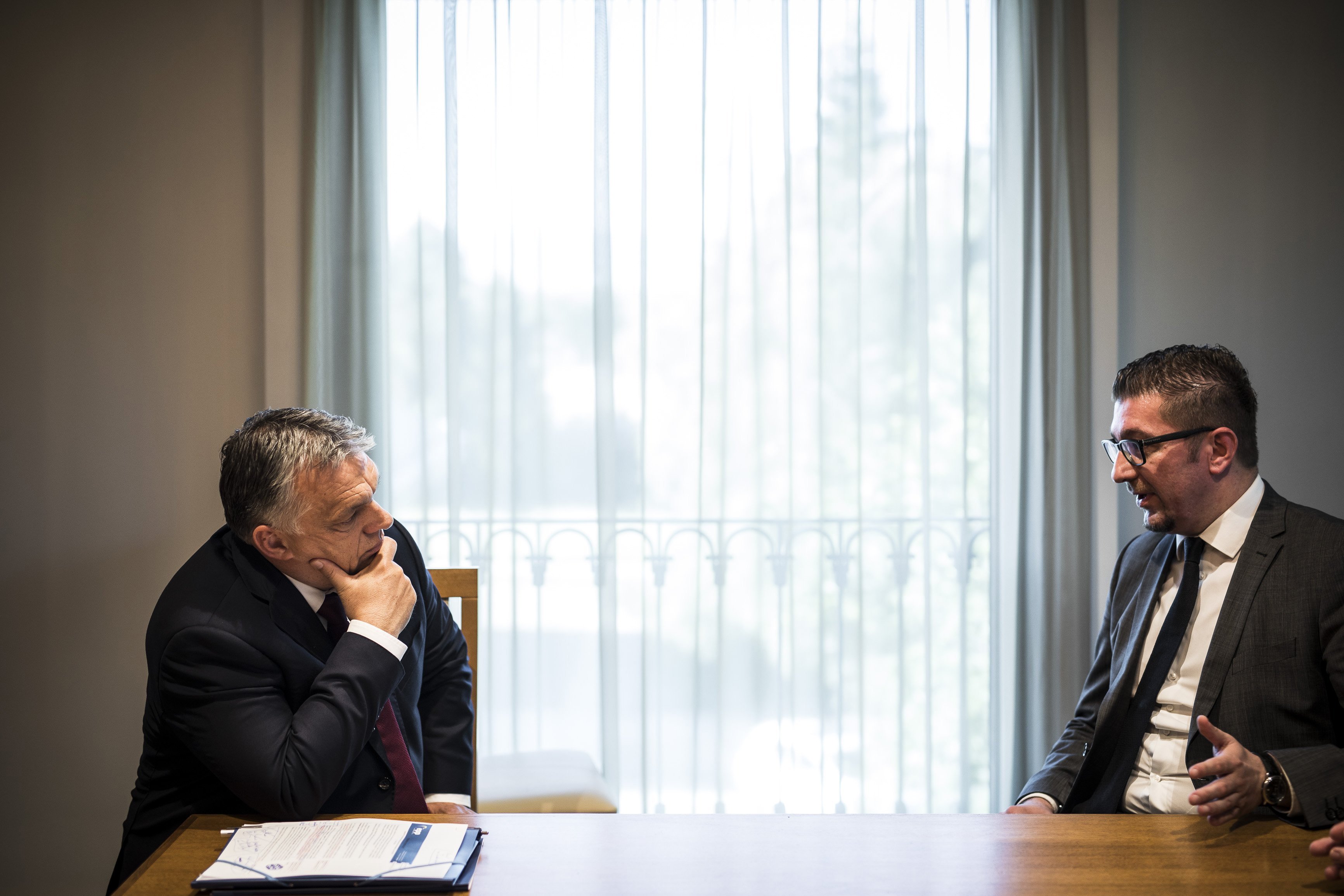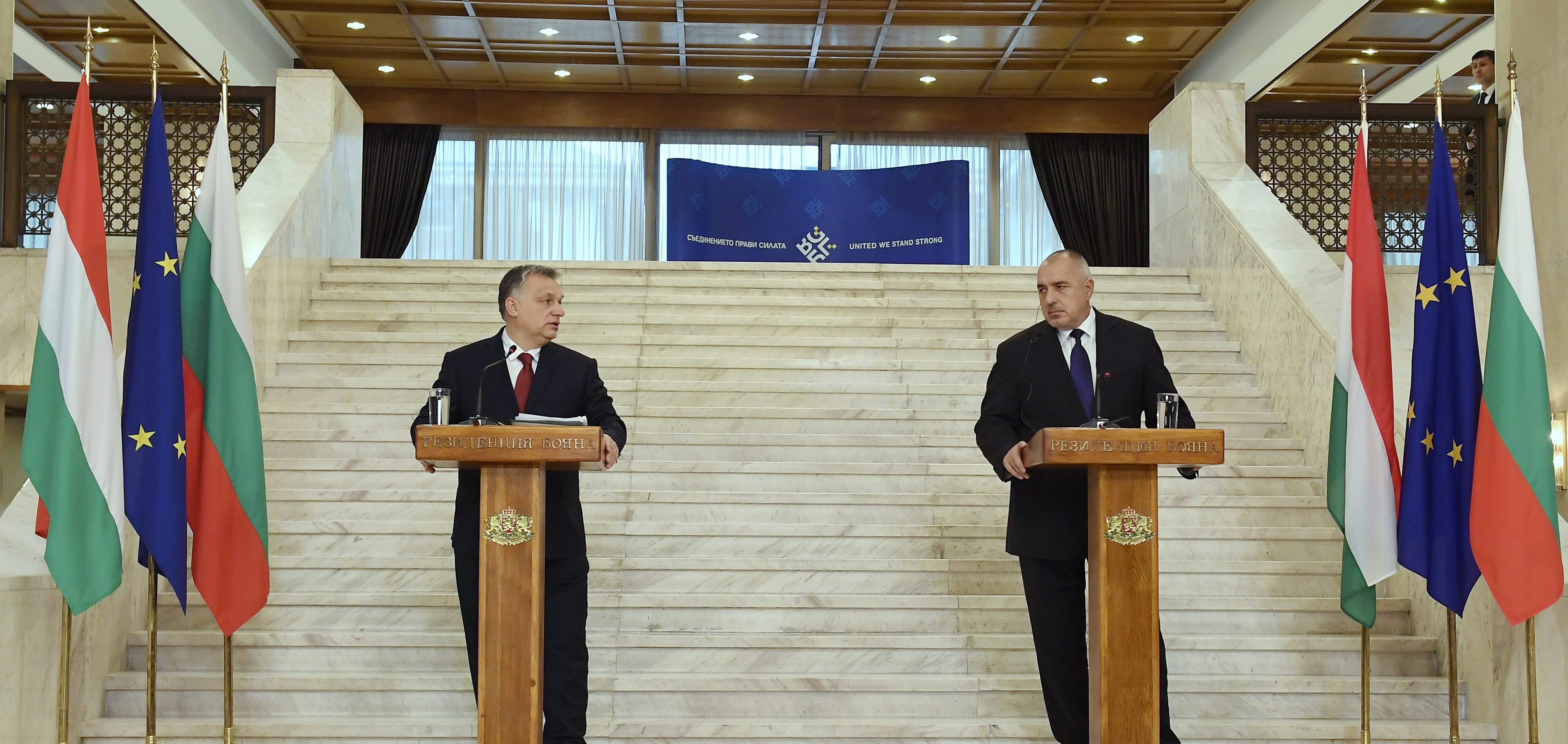
I’m grateful to the Prime Minister for having received me. I congratulate you: as I see it, your presidency [of the Council of the EU] is going well. Half of Europe is coming here, in quick succession: after I’ve left, tomorrow the Chancellor of Austria will come to visit you. This highlights the important role that Bulgaria plays in European politics today. Let me say that there is a friendly relationship, a heartfelt friendship, between Hungary and Bulgaria. In our bilateral relations there are no conflicts of any kind. We have an awareness of a shared historical fate: in the course of history we have had to endure trials of a similar nature after World War II, and also in the more distant past. Naturally politics is a realm of interests, but here in Central Europe and in the Balkans things are a little different: here sentiment, friendship and history also carry a great deal of weight. I have expressed the Hungarian people’s friendship and respect to your prime minister, my friend Boyko Borissov, and I have told him that we sincerely hope that the net, the fabric, of economic and political relations between the two countries will be woven ever more closely. Observing the development of the Bulgarian economy, we Hungarians would also like to take part in the process of Bulgaria’s reconstruction; and likewise we invite Bulgarian businesses to come to Hungary to take part in our country’s success.
Ladies and Gentlemen,
Our talks, however, were not centred on bilateral relations, but on European affairs. We discussed two large groups of topics: one was the future of Europe, with special regard to the Balkans; the other was the protection of borders and the issue of migration. First of all, I congratulated Bulgaria on the advantageous and skilful way in which it has shaped its relations with Turkey. I pointed out that Hungary will always support agreement and cooperation between Turkey and Bulgaria, because the borders must be defended at the same time as concluding agreements on their defence. So the Government of Bulgaria can always rely on Hungary’s support for Turkish-Bulgarian cooperation.
Ladies and Gentlemen,
We are on the threshold of a historic opportunity, and a historic task is being borne by the Bulgarian Presidency. The gate of an opportunity has just opened up: we can take a decisive step towards integrating the Balkans into the European Union. We are all aware that Bulgaria is a member of the European Union, but it’s not yet a member of the Schengen Area – even though it should be. And there are several countries between Bulgaria and Hungary which for some time now have been seeking admission to the European Union, but have not yet been admitted – even though they should have been. I am pleased to see that Bulgaria is assuming the historic responsibility of taking this matter in hand. Here in May you will host a major conference on the Balkans. I believe it was a splendid decision to call this conference, and I wish Prime Minister Borissov every success in it. The Hungarian prime minister will surely also attend that event. On that I can only make a partial promise. But what is certain is that the conference will be a decisive one, because a final, conclusive statement must be made here regarding enlargement – especially related to the admission of Montenegro and Serbia. A timetable, a timeline will have to be determined, and we’ll also have to decide on some major projects which Prime Minister Borissov will present to us. It’s not enough to admit the Balkans to the European Union in a political sense: the region must also be strongly linked to the European Union in other ways. Political declarations are in vain if the two are not connected, if the links aren’t created: if – God forbid – there are no rail links, no rapid rail links or TGVs; if there are no roads, no motorways. Without these the Balkans cannot integrate with the economic body of the European Union. This, though, is what we all need. And if we play our cards right, Bulgaria can benefit from this process – as can Hungary, Serbia, Montenegro and the other Balkan countries. So I wish Prime Minister Borissov every success in this enterprise. He has taken on a huge task, and we hope he’ll succeed.
Our second major topic was border defence and migration. Leaving aside complex procedural issues for now, the essence of the matter is that the European Union has tabled a new migration proposal. We don’t like this proposal as it stands. This proposal continues to focus on mandatory migrant relocation. The Hungarian Constitution makes it clear that only individuals and organisations elected and mandated by the Hungarian people can decide on issues such as who may reside in the territory of Hungary. As we see it, the European Union’s proposal keeps expanding. The number of migrants to be mandatorily taken in keeps growing: earlier it was one thousand, and now we stand at ten thousand; the number keeps increasing. Clearly we are talking about quotas with no upper limit on numbers. We think that in fact the debate on migrant quotas – particularly on mandatory migrant quotas – encourages more migration. I suspect that many people west of Hungary’s state borders believe that, in the final analysis, migration is a good thing – and that it is also inevitable. In our view, however, this is not the case: we believe that migration is a threat to public security, to our prosperity and to European Christian culture. Therefore we decided to prepare a proposal of our own: a series of proposed amendments, a package which contains Hungary’s proposals. The essence of these proposals is that the European Union should finally start focusing on the defence of the borders, rather than on the allocation, relocation and distribution of migrants. There’s no point in talking about allocation until we guarantee the complete protection of our external borders. These proposals are now complete. I’ve informed Prime Minister Borissov of their content, and I’m also handing over to him this dossier, the Hungarians’ proposals.
Ladies and Gentlemen,
Bulgaria deserves recognition for protecting its external borders, and in doing so it is also protecting Hungary. To tell you the truth, we Hungarians realise that your prime minister is not only important for Bulgaria, but also for Hungary, because the borders can only be protected under the guidance of strong leaders who have clear democratic mandates and who are not afraid to take the necessary decisions: when the need arises, for instance, to build fences – as the Honourable Prime Minister has done. I have been over there and seen the physical lines of defence for myself – and I can only speak about them in terms of praise.
Ladies and Gentlemen,
We need European solidarity in the defence of our borders, rather than in the distribution of migrants. According to our proposal, we demand that every Schengen Member State of the European Union honours the border protection obligations it has officially agreed to. If they are unable or unwilling to do so, we should not be afraid to draw the necessary conclusions and move the Schengen border one country further in: to where there is both the will and the capability to stop the flow of migrants and to defend the borders. Hungary’s position remains unchanged. We can see that in many places around the world conditions are difficult, but we believe that help should be taken there, rather than bringing the problems here.
Many thanks to Prime Minister Borissov for receiving me and giving me the opportunity to have talks with him today.

